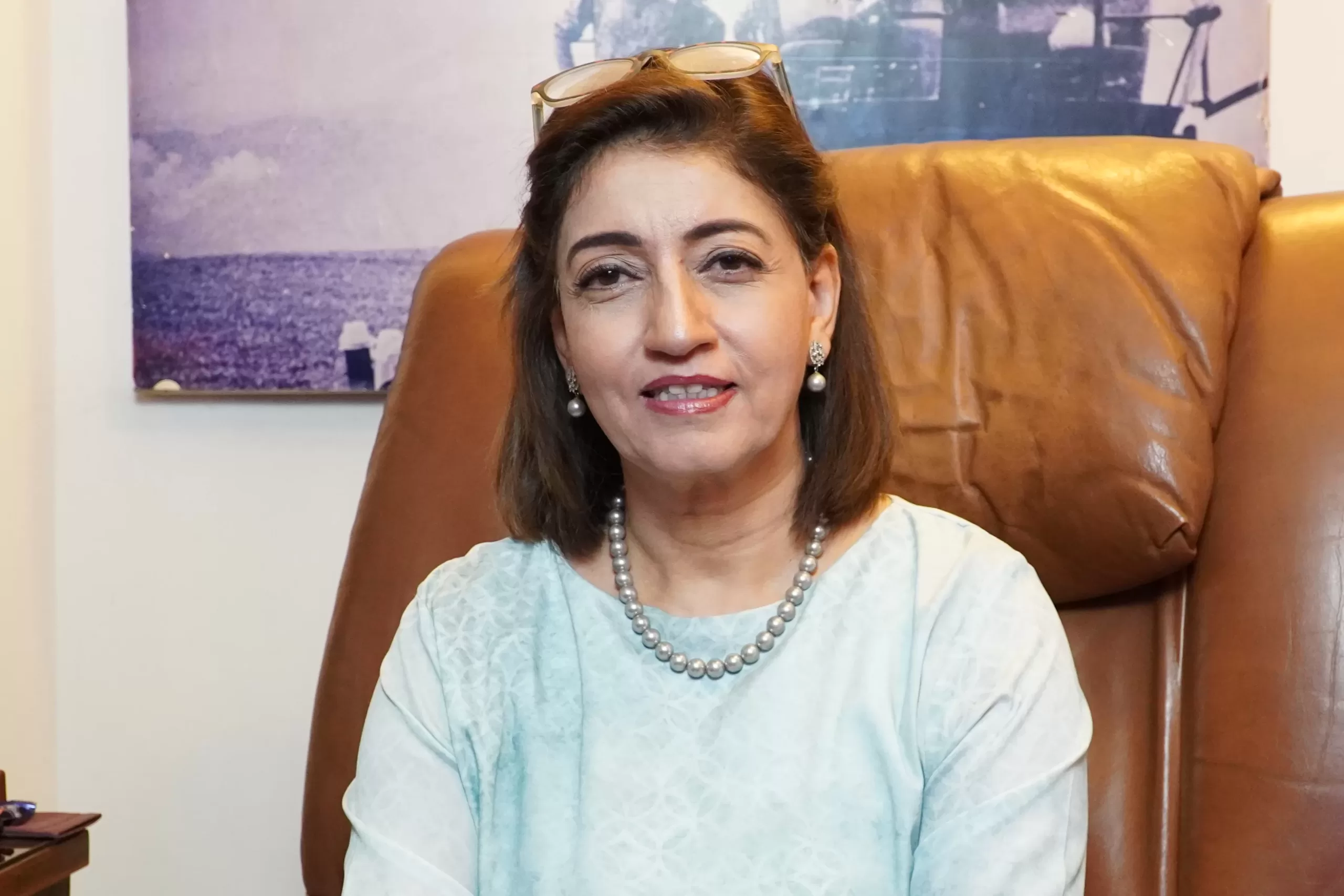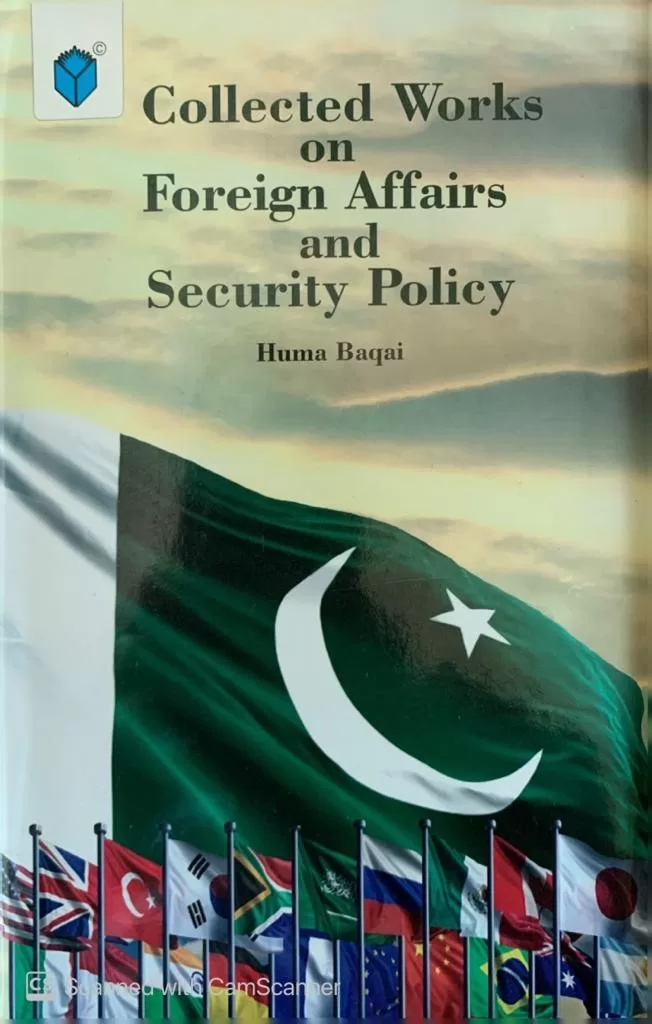Huma Baqai’s Collected Works on Foreign Affairs and Security Policy is a notable collection of scholarly writings that look into the complicated sphere of international relations. It spans Asia, South Asia, North America, and the Middle East, encasing a broad spectrum of vital geopolitical and local concerns. In essence, the book is a compilation of thoughtfully selected articles written by Dr Baqai and published in Pakistani newspapers between 2018 and 2022. These comprehensive and thoroughly researched pieces address numerous topics, including the internal as well as external affairs of Pakistan, Middle Eastern politics, the crisis between Russia and Ukraine, and much more. Additional topics covered by the author include US-Iran relations, Pakistan-India relations, US-Pakistan relations, the effects of the US exit from Afghanistan, India-US strategic alliances, and a multitude of other pertinent topics. The author argues that managing Pakistan’s foreign affairs should be done with caution due to the complex outside factors influencing the country. She also explains that the stability of Pakistan’s internal politics and national security are significantly impacted by the rapidly changing regional geopolitical power. She suggests that, given our key geographic location, we must pursue a more balanced strategy as the changing regional and geopolitical setting has resulted in the formation of new coalitions and alliances.
The book excels in offering diverse perspectives on the complexities of international affairs, particularly as they pertain to Pakistan’s international role and its relations with South Asian countries. Readers will gain a multifaceted view of Pakistan’s presence in international affairs and its multilayered interactions with major countries via this book. As the international environment changes regularly, the book also illustrates how powerful countries like India, Russia, China, and the US manage their interactions with one another. She points out that the deepening strategic alliance between the United States and India, as well as the China-Pakistan partnership, are indicative of the current multipolar global order. Following the conclusion of the United States military involvement in Afghanistan, the dynamics of U.S.-Pakistan relations post-9/11 have now returned to their original state. Initially presented as a strategic partnership, this relationship evolved into a transactional one over the years. With the withdrawal of American forces from Afghanistan, the framework for the future direction of bilateral ties remains undefined.
Dr Baqai also highlights in the book Pakistan’s growing strategic ties with China and the growing tensions between Washington and Beijing. The changing geopolitics and alliances have drawn China and Pakistan closer together, with the China-Pakistan Economic Corridor (CPEC) exemplifying this. China’s growing geopolitical assertiveness and concerns about Pakistan’s security and development are seen as challenges to the US’s economic leadership. The Belt and Road Initiative (BRI), a vast infrastructure development project linking the Silk Road with Europe, signifies China’s growing geopolitical ambitions, including transforming Eurasia into a central economic and trade hub to disrupt the US-led transatlantic regime.

Dr Baqai’s book explores how Pakistan’s deteriorating relations with the US have led to closer ties with China and Russia, who share similar views on Afghanistan and regional issues. Pakistan and Saudi Arabia have a long history of close strategic relations, but maintaining good relations with Iran is challenging. The political upheaval in Afghanistan, particularly the Taliban’s return to power, has significantly impacted regional geopolitics. The Taliban’s control of the Durand Line has boosted the Islamist insurgency in Pakistan, and reports suggest that splinter groups of the Tehreek-i-Taliban-e-Pakistan (TTP) are reuniting with ISIS, leading to increased cross-border attacks in former tribal districts. The presence of militant sanctuaries in Afghanistan is a concern for both the international community and Pakistan. It is a well-compiled work as it covers the strained relations between India and Pakistan due to India’s illegal annexation of Jammu and Kashmir on August 5, 2019. The situation escalated in February 2019, but Pakistan’s response and a ceasefire have helped lower tensions. While the situation has fallen silent along the LOC, it is too early to expect major changes. The two countries must overcome obstacles before engaging in meaningful dialogue on critical issues, as in the past four years, the global environment has changed significantly.
Scholars are given access to authentic sources that may be used as a basis for their study, thanks to the organized methodology used in each article, which guarantees an extensive examination of the topic at hand. The author analyses Pakistan’s role in South Asia and on the global stage. She explores a variety of pertinent subjects, including the complex dynamics of Pakistan’s relations with the United States, the frequently tumultuous relationships between Pakistan and India, Pakistan’s efforts to maintain a balance in its relations with Iran and Saudi Arabia, its long-standing alliance with China, and the effects of the Afghanistan conflict on Pakistan. Anyone wanting to gain insight into the changing landscape of Pakistan’s foreign policy, ought to read these pieces as a vital resource.
The book is undeniably a priceless repository of knowledge, offering well-researched data and presenting Huma Baqai’s insightful perspectives. These articles are a testament to her deep understanding and the range of viewpoints she brings to the intricate field of international relations. For individuals eager to delve into contemporary global affairs and security policies, this book’s extensive content proves to be an invaluable resource. It can also serve as a compelling case study for students specializing in political science and international relations, aiding them in enhancing their comprehension of regional and global challenges. Moreover, it is essential reading for those engaged in shaping foreign policy. Huma Baqai’s work is not only accessible to academics but also to anyone with a general interest in international affairs. The content is meticulously researched and thought-provoking. Each article within the book possesses a timeless quality, ensuring that readers will find it pertinent regardless of when they engage with it.
A notable omission in the book is the absence of any discussion regarding Pakistan’s initiatives to foster peace in the inherently intricate relationship between two neighbouring countries, both armed with nuclear capabilities: India and Pakistan. One such endeavour was the opening of the ‘Kartarpur Corridor,’ which served as a visa-free border crossing and a religious passage connecting the Gurdwara Darbar Sahib near Lahore in Pakistan to Gurudwara Dera Baba Nanak in the Gurdaspur district of Punjab, India. Remarkably, this corridor was established during a highly tense period marked by hostilities between Pakistan and India following cross-border tensions in February 2019.




